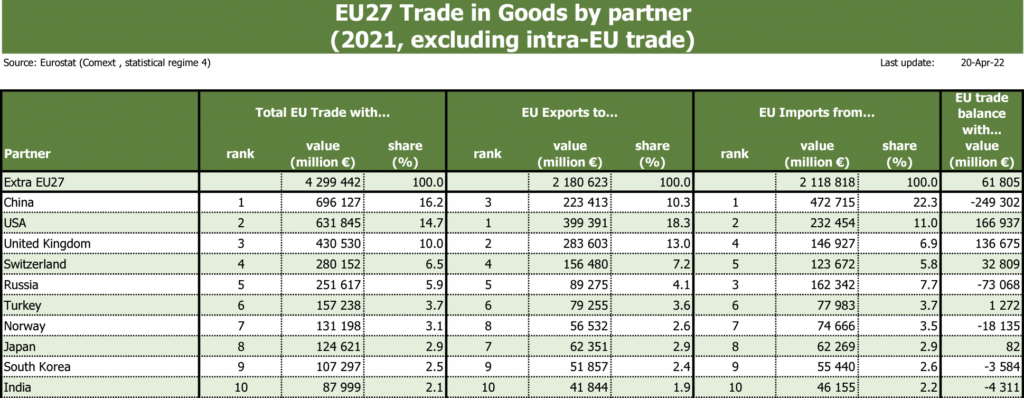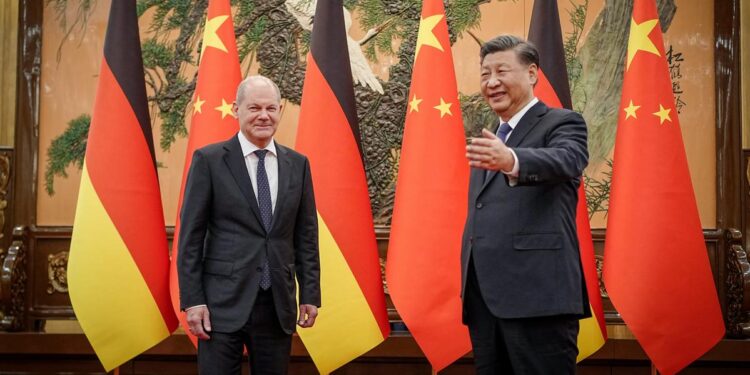On Thursday German Chancellor Olaf Scholz published a very interesting – and probably historic – essay in Politico. “We don’t want to decouple from China,” the headline ran, “but can’t be overreliant”. Yet this somewhat banal statement papered over some radical claims in the text. Consider the following paragraph:
No country is the “backyard” of another. What is true in Europe regarding Ukraine is also true in Asia, Africa or Latin America. It is here that new centers of power are emerging in a multipolar world, and we aim to establish and expand partnerships with all of them. Thus, in recent months, we have carried out in-depth coordination at the international level — with close partners such as Japan and Korea, India and Indonesia, and countries in Africa and Latin America too. At the end of next week, I will travel to Southeast Asia and the G20 summit, and while I’m visiting China, Germany’s federal president will be in Japan and Korea.
Note the highlighted text: Scholz and the German government take for granted that what is emerging is a multipolar world; and they intend to become flexible in their foreign policy, to take advantage of this. Scholz’s vision is directly opposed to the rhetoric coming out of Washington DC. The Americans believe the new strategy should be to hunker down and reduce engagement with the non-Western world in order to preserve Western – or, more properly, American – hegemony.
Until very recently, writing articles pointing to the emerging multipolar world (and the ensuing geopolitical landscape) was enough to get you attacked on Twitter. I have been writing about this since March, and have been denounced as everything from a Putin apologist to a stooge of the Chinese government. Yet now a major world leader is saying the same thing. Suppressing this nascent reality will now become all but impossible: the genie is out of the bottle.
Some have suggested that America will not allow Germany to go down the path of accepting multipolarity. If or when economic – and even possibly military – conflict between the United States and China becomes very acute, the Europeans will be forced to choose a side. You can be sure that the Germans have already taken this into account and factored it into their strategy. The simple fact is that America is no longer Europe’s largest trading partner – that is China. The numbers below bear this out.

As we can see, China has overtaken the United States. Europeans have had a bad experience with their sanctions against Russia, and although the press continues to promote them and European leaders have not yet been able to walk them back publicly, there is widespread discontent among those leaders. If America insists on Europe cutting its ties to China – while China makes no similar demands regarding the United States – that will be a very tough sell indeed.
Here’s where the United Kingdom comes into the picture. If you add together US and UK trade with the EU, it does vastly outstrip trade with China. This raises the possibility that America and Britain will form a united front to pressure the EU into cutting ties with China. It is debateable whether this is a sensible proposition for the US – I believe that it would destroy the US economy – but there is no doubt what such a stance would mean for the British economy.
Living standards in Britain would plummet if these kind of trade war tactics were adopted. It is likely that if the UK got into a trade war on three fronts – with Russia, China, and the EU – living standards would fall far below those of even the poorer Eastern European EU member states. Given that one third of products consumed by British consumers are imports, the country would likely collapse into a hyperinflationary heap. Such a collapse would be comparable with Russia’s horrendous collapse in the 1990s.
Yet such a scenario is not impossible to imagine. Britain may well decide to stand with the United States against the rest of the world.
Philip Pilkington is a macroeconomist and investment professional. You can follow him on Twitter here and subscribe to his Substack newsletter here.











To join in with the discussion please make a donation to The Daily Sceptic.
Profanity and abuse will be removed and may lead to a permanent ban.
I am becoming increasingly of the opinion that there is a supranational movement orchestrating global affairs. They have been acting mainly through the US for many decades. But there has been infiltration or conditioning of most governments in the world to behave in certain ways, mostly in lockstep but sometimes in opposition.
The above article describes what seems to be a justified challenge to the US hegemony. However, on the current stage of media-manipulated information and news, even this challenge may be part of the same prepared drama.
It’s all rather dispiriting. Hard to know who to trust. USA, EU, China, Russia – none are overly appealing as close allies or people to rely on or have close ties with. Then again, I don’t trust our own government and institutions in the UK.
My gut feel is that the USA is our best bet provided they elect a Republican senate and president who are truly interested in freedom and not addicted to sticking their nose into everything, but that’s a somewhat forlorn hope.
‘Dispiriting’. There you have it! It is almost as if becoming dispirited and zombie-like is part of a plan. In opposition to this, some sort of spiritual perspective or philosophy is needed. That is our individual choice – whatever works for us.
I think we can become attached to things like a two-part epoxy glue. External events incorporate the base and the internal reaction incorporates the hardener. We become stuck only when both are present. The external base is only mildly tacky if we don’t contribute the internal hardener.
Indeed, very wise words.
Loving the six downvotes, presumably for saying the USA is our best bet. Standard of debate seems a bit variable here; disappointing.
It should never be down to trust. Sooner or later it is bound to be betrayed.
The trouble with China and Russia is that most of the information we have about them is presented through the filter of Western prejudices and propaganda. The US is particularly good (bad) at this and the situation of the Uighurs in China is worth digging into and going beyond the anti-Chinese headlines.
I’m sure all sorts of things are misrepresented on every side.
I’m under no illusions about the West being nicer to other countries and their people, but I think they are nicer to their own citizens (but the gap is narrowing).
From your list it’s easier to know who we can’t trust, all of them. But the USA are the least untrustworthy. All the others have said or acted against the interests of the UK more recently and more often.
Indeed. Though what the USA is doing and pushing us to do wrt Ukraine doesn’t seem to me to be in our interests.
As Cicero observed, the enemy within is to be feared the most.
What’s with the 12 down votes? Hard to know whom to trust – check; all are unappealing – check; don’t trust the UK either – big check; USA may be best ally, but only with a Republican senate – check again. I sincerely don’t see that objection to any of that, unless you’re a Guardian reader. Any down-voters out there who’d care to clarify?
The enemy is globalism.
If America continues to protect and promote its technology monopolies – in particular the social media companies, and continue to promulgate a fascist relationship between state and business, using it to further suppress freedom of expression, freedom of association (in particular political association) and tilt markets further in the direction of the likes of “favoured” ESG businesses owned by billionaire and ESG based private equity firms, then there is very little incentive not to deal with China while continuing to tax the real small business owners to oblivion. They will have become a kind of China-lite anyway where the principles Freedom and democracy have become little more than bad mock Tudor beams on cheaply built 1970’s housing. We either revitalise the principles that have marked the West out or we continue on the current destructive path. We either revitalise true democracy, free speech, freedom of expression, and defend it tooth and nail, or we compromise our fundamental principles and enter a totalitarian hellscape. We are right now teetering on the edge and only the slightest push will send us over if we haven’t started the tumble already.
Excellent summation.
Russia, China, North Korea, Iran etc are not seeking peaceful coexistence in a ‘multipolar world’ but are rather engaged in an individual and joint ideological, propagandist, economic and military (actual and threatened) project of conquest over the multi-party liberal democratic regions.
By way of example have a quick glance at Russia’s former President and Prime Minister Dmitry Medvedev’s recent rant about Russia’s spiritual-historical destiny to overthrow ‘a dying world… [through an] awakening awaited by other countries, raped by the masters of darkness, the slave masters and oppressors, who dream of their monstrous colonial past and yearn to maintain their power over the world.’
https://www.themoscowtimes.com/2022/11/04/medvedev-rails-against-west-to-mark-russian-unity-day-a79290
China’s Xi Jinping has also repeatedly referred to the superiority of the CCP model and called for a ‘New Long March’, in other words violent revolutionary overthrow of the US (and by implication) all other democracies.
The militant and expansionist form of Islam symbolised by Iran has anti-democratic universal hegemony built into its DNA.
At a general level single party tyrannies can never co-exist peacefully with democracies, because the vastly superior (though still far from perfect) model of the latter represents a constant beacon of hope to their own down-trodden populations and desire to achieve similar freedoms and rights.
If Scholz is a world leader in anything, it would be Bending over to get shafted (or rather, bend over so that Germany can again get shafted), That’s – in fact – all the SPD has ever done since it staged a coup in 1918 to take over power in Germany on the mistaken assumption that the legitimate government had already sorted the thorny problem how to get out of the first world war with a black eye and no further damage. It’s the principally unprincipled party — always ready to betray anyone and anything provided its members stay in power (and parliament) and someone else (ie, ordinary Germans) can be made to foot the bill.
[No, the CDU isn’t any better. That’s a nome de plume for the former Zentrum which managed the interesting manoeuver of first providing the necessary 2/3 majority so that the Hitler-government could abolish the Weimar constitution and then – after the war – recommended themselves to the new overlords as just the right kind of always un-fascistic political association to administrate the Rhenish republic it already wanted before 1933. The SPD-leaders of that time obviously knew about this. But who would want to air yesterday’s dirty laundry when the bells are tolling Back into parliament and back into power!]
Germany in bed with Communist China
Yellow Freedom Boards – next event
Monday 7th November 11am to 12pm
Yellow Boards
Junction B3430 Nine Mile Ride &
New Wokingham Road,
Wokingham RG40 3BA
Stand in the Park Sundays 10.30am to 11.30am – make friends & keep sane
Wokingham
Howard Palmer Gardens Sturges Rd RG40 2HD
Bracknell
South Hill Park, Rear Lawn, RG12 7PA
This is not the first shot fired between the US and Germany by any means.
The Fed has been undermining the EU economy with its policy for months now.
This just heats things up a bit more.
Did Scholz have to do the 10 day quarantine everyone is required to do before entering China?
Obviously not.
But, but, the virus is deadly…
No worries, he’s had the safe and effective vaccine
So the German government are looking after their own interests and shafting everyone else? Well, what a surprise. That’s never happened before has it?
Corrupt and decidedly unwillingly German ‘democrats’ moving towards a source of money. Apart from that, since this year, everybody aged 14 or older can change is officially registered sex (ie, the one recorded in state ID documents) freely once per year in Germany. That’s hardly insufficiently American.
It appears that a G7 country is trying to stay friendly with the BRICS countries. Installs a lot of confidence in the G7 agenda if one member is looking elsewhere.